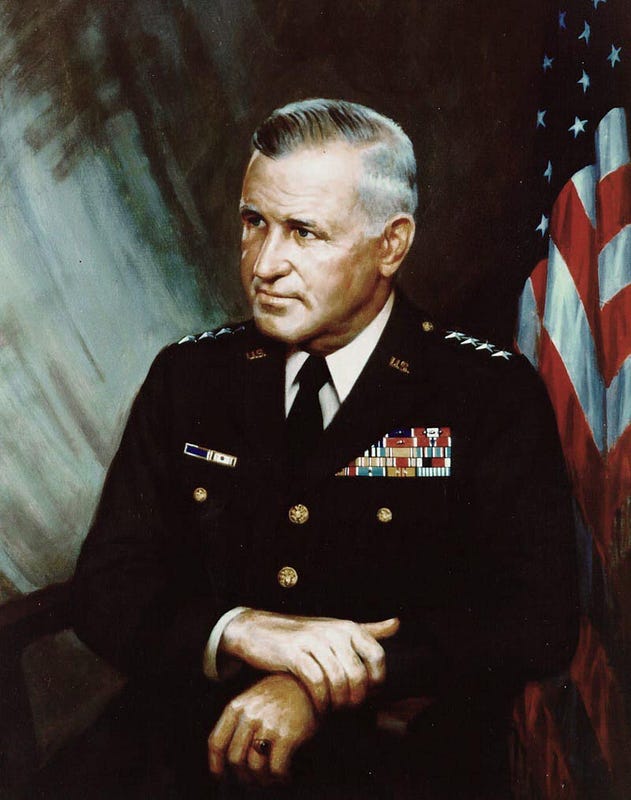The bureaucracy or the people?
This post was provided by Andy Rohrer, a US Army Strategist currently serving in the Pentagon. The views expressed belong to the author alone and do not represent the US Army or the Department of Defense.
Recently, Matt Cavanaugh published a short essay positing that the Profession of Arms was in decay. He stated that “[t]he Profession of Arms is decaying (weakening or fraying—as opposed to a relative decline), and the primary causes are neglect, anti-intellectual bias, and a creeping, cancerous bureaucracy.” From that point he asserts that the blame for this condition lies at the feet of the Army, an institution charged with the defense of the nation now barely able to perform its duty because it is overtaken by bureaucracy. I concede there is a bias towards anti-intellectualism in the Army; however, members of the institution, not just the inanimate institution itself, bear part of the blame. Thus, it is better argued that the bureaucracy creates incentives that perpetuate an existing preference toward anti-intellectualism among the members of the institution. This is not to say that the people who form the institution are unthinking, incurious individuals, just that the institution is not solely to blame if a person displays the traits of anti-intellectualism.
General Creighton Abrams, while Chief of Staff of the Army stated that, “Soldiers are not in the Army. Soldiers are the Army.” Recognizing the Army was not well-regarded by the population, suffered widespread low morale, and desperately needed modernization, this statement succinctly acknowledged that the status quo was no longer acceptable in the context of a force no longer able to draw on conscripted service from the nation. The statement also put in plain words that the Army is its people; its character and culture reflect those who serve. In that vein, blaming only the bureaucracy for the malaise of the institution while avoiding any share of blame for the service-members, which are the institution.
First, a short discussion on the nature of the bureaucracy’s impact on people is in order to properly frame how the individuals bear equal responsibility. The examples given by Cavanaugh in his piece to illustrate bureaucracy’s effect—a nonsensical uniform regulation and a requirement to complete multitudes of paperwork to travel to Mexico—are not examples of bureaucracy stifling intellectualism; they are reflections of a bureaucratic aversion to risk. The former is an example of what American soldiers during World War 2 called ‘chickenshit’—“petty harassment of the weak by the strong; open scrimmage for power and authority and prestige; sadism thinly disguised as necessary discipline; a constant ‘paying off of old scores’; and insistence on the letter rather than the spirit of ordinances.” The latter is an example of how a complex bureaucracy keeps track of an individual it employs, and how it protects itself should something unforeseen occurs.
However, the bureaucracy itself did not enact the rules and regulations that drove the policies described; it only propagated and maintained them. If one could get to the root of the policies, the original decision or decisions that formed them likely were well-intentioned, but as they were applied, quickly revealed their senseless and unnecessary nature. It is probable that subsequent leaders, conditioned to avoid career risk, and belonging to an institution with very conservative views on change, have since then simply gone along in an “Abilene Paradox” despite the maddening inconvenience and uselessness even to themselves. Nonetheless, both are irritating examples of what people endure and promulgate within the bureaucracy, but neither rises to the level of a bureaucratic maneuver that stifles or interferes with intellectualism.
 So how did the modern Army bureaucracy get the way it is? At its root is the promotion system that the uniformed services of the Department of Defense (DOD) adhere, written into the US Code under Title 10 by Congress in 1980 by a Public Law known as the Defense Officer Promotion Management Act (DOPMA). The law was passed to standardize officer promotions and management across the DOD. It established uniform timelines for each grade held along with promotion eligibility windows — and set the current “up-or-out” system that gives each officer two opportunities for promotion, and if passed over twice is separated, to maintain the integrity of the officer timelines the law established.
So how did the modern Army bureaucracy get the way it is? At its root is the promotion system that the uniformed services of the Department of Defense (DOD) adhere, written into the US Code under Title 10 by Congress in 1980 by a Public Law known as the Defense Officer Promotion Management Act (DOPMA). The law was passed to standardize officer promotions and management across the DOD. It established uniform timelines for each grade held along with promotion eligibility windows — and set the current “up-or-out” system that gives each officer two opportunities for promotion, and if passed over twice is separated, to maintain the integrity of the officer timelines the law established.
Within the Army, a bureaucracy that requires clear guidelines for every official action, the application of DOPMA became defined by clear qualification criteria for each successive promotion, the two components of the criteria being required Professional Military Education (PME) and “key developmental,” or KD, assignments. This system makes plain the standards of qualification, serving as a guide for each officer as they manage their careers. Ostensibly, this system ensures that officers are appropriately developed and will then for each peer cohort, or Year Group, provide the best possible bench of available Colonels to select each cohort of Brigadier Generals. In place for over 30 years, this system has produced nearly every serving General Officer today. Therefore, any judgment to the quality of our General Officer leadership is in turn a judgment of the promotion system and the bureaucracy upon which it depends.
So why are PME and KD assignments relevant to a discussion of anti-intellectualism? First, the combination of PME and KD can in some cases fill up 3 years of time in a particular grade, leaving little time for other endeavors. Second, the timing of where these assignments will fall in an officer’s timeline can make participation in decidedly intellectual pursuits challenging, if not risky. Thus, many officers choose to pass up opportunities to compete for fellowships, Advanced Civil Schooling (ACS), and other broadening opportunities for fear that if they go to those positions they may endanger their “timeline” to successfully complete the required assignments for promotion eligibility. This is not universal, as some opportunities are shorter in length than others, it still remains that interest in these non-standard, yet career broadening, assignments is often correlated to the length of the programs, presumably because they are less risky to a developing career. This is odd, however, because the Army is a risky endeavor and officers are expected to accept and manage great personal risks, even with other people’s lives as they focus on the mission; yet, something that on its face appears career enhancing is generally avoided because of the risk to one’s career, a truly bureaucratic response to risk.
 More important than risk, which informs choices, are the choices themselves. Despite a bureaucratic system of promotion, with clear timelines and development criteria, each individual has a choice. Choice is inherently human. It is literally agency: the action to accomplish something. It would be foolish to think that risk aversion is the determinant factor in a person’s anti-intellectualism. Previously, General Abrams was quoted in the context of recruiting young Americans to join an All-Volunteer Force (AVF) in the wake of Vietnam. His statement was valid then, and remains valid today. The space here is too constrained to explore whether the modern AVF is truly reflective of the American people, but for sake of brevity, it should be assumed it reasonably represents the population. If this is so, then perhaps the blame for anti-intellectualism, a choice made by people, is really a reflection of American society.
More important than risk, which informs choices, are the choices themselves. Despite a bureaucratic system of promotion, with clear timelines and development criteria, each individual has a choice. Choice is inherently human. It is literally agency: the action to accomplish something. It would be foolish to think that risk aversion is the determinant factor in a person’s anti-intellectualism. Previously, General Abrams was quoted in the context of recruiting young Americans to join an All-Volunteer Force (AVF) in the wake of Vietnam. His statement was valid then, and remains valid today. The space here is too constrained to explore whether the modern AVF is truly reflective of the American people, but for sake of brevity, it should be assumed it reasonably represents the population. If this is so, then perhaps the blame for anti-intellectualism, a choice made by people, is really a reflection of American society.
Thirty-one soldiers celebrated with the Chief of Staff of the Army on the 35th anniversary of the all-volunteer force by enlisting or re-enlisting in the Pentagon courtyard.
In the mid-1960s, Richard Hofstader, a professor at Columbia University published a book called Anti-Intellectualism in American Life in which he dissects anti-intellectualism in America, recounting its history in America, and then details its impact on education, especially as it became more democratized after World War II. In the book he argues that the American culture of anti-intellectualism springs from a common American belief that education and expertise are signs of elitism—an idea that is a terribly damaging epithet in modern America. The book explains the rising and retreating of this ideal as being cyclical, but it is clear that it is not suddenly new, and though the book was published over 50 years ago, it still remains relevant today. If there is indeed a cultural bias toward anti-intellectualism, then it stands to reason that the soldiers, the officers, who are the United States Army, are themselves anti-intellectual as a group. Thus, the proper blame to affix to the bureaucracy would be that it perpetuates a predisposition of American culture.
Therefore, the argument that there is a strain of anti-intellectualism in the Army posited by Matt Cavanaugh is largely correct. However, as he stated it, the blame for this condition rested on the bureaucracy of the institution. Though not entirely clear in his piece, he is correct that the bureaucracy exhibits tendency toward risk aversion. Instead, the bureaucracy creates incentives that perpetuate an existing bias toward anti-intellectualism among the people that are the institution. This is an important discussion to have, especially as the Army is now going to reduce its size to 420,000 soldiers on active duty, it is vitally important that intellectualism is reintroduced to the force. But, maintaining the status quo will not achieve this; the bureaucracy will need to be changed and will require bold leaders unafraid to take risks to make that happen.

No comments:
Post a Comment